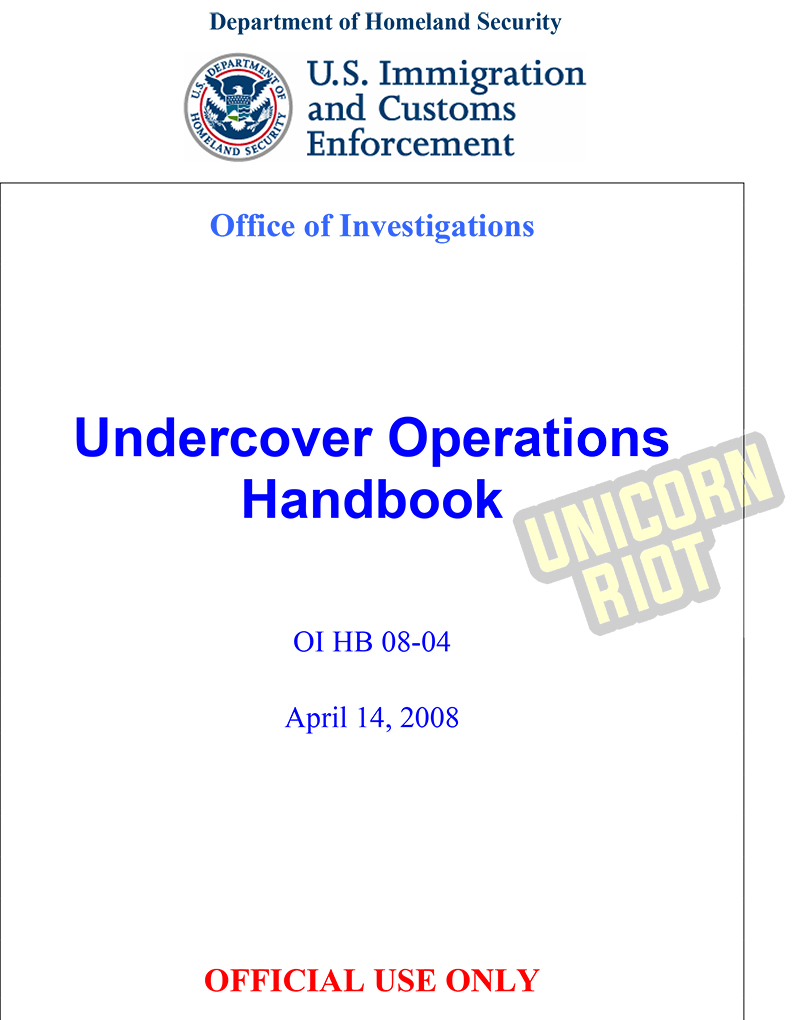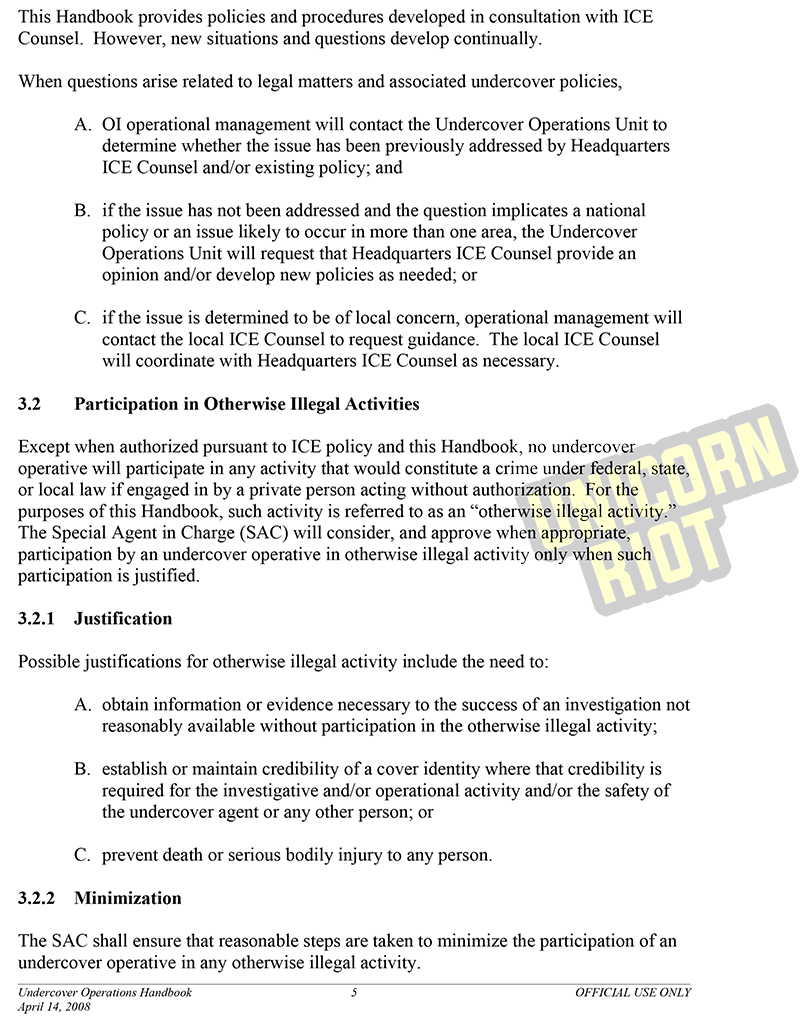

Havasu and Bullhead City police said they were told by HSI that the agents’ actions were within agency guidelines.
“Detectives were informed by HSI that the undercover sexual activity was authorized,” Emily Fromelt, a spokeswoman for the Bullhead City Police Department, said in an email.
Havasu police Sgt. Tom Gray said, “Our understanding of HSI policy is their investigators are allowed to participate in sex acts while working undercover.”
Both police departments said they have strict policies forbidding their officers from sexual activity with subjects of their investigations, and Arizona is among the states that have laws making such behavior illegal.
“Nobody should be able to engage in criminal activity,” said David Thomas, who has led sexual misconduct training for the International Association of Chiefs of Police. “It flies in the face of that oath that an officer, an investigator stands there and raises their right hand and swears to.”
Nonetheless, an ICE Undercover Operations Handbook from 2008 lays out “possible justifications for otherwise illegal activity.” The handbook was posted online in 2018 by Unicorn Riot, which describes itself as a nonprofit media organization of artists and journalists. It does not say how it obtained the document.
Garcia, the former HSI deputy special agent in charge who retired in 2017, pointed Howard Center reporters to the online handbook.
“That appears to be a copy of our manual,” he said. An ICE spokeswoman said she could not comment on a document not released by her agency.
Garcia said the handbook could have been updated since 2008, and he noted there were other policy manuals for specific investigations, such as sex- or human-trafficking. But, he added, “I don't recall the policy manuals saying you can't have sex with human-trafficking victims. I just know that's something we are not allowed to do.”
The existence of such a handbook was confirmed in 2017 when the Department of Homeland Security released its “HSI Special Agent Manual Index” in a response to a Freedom of Information Act request.


An excerpt from an online handbook identified as ICE’s Undercover Operations Handbook, which lays out for undercover agents “possible justifications for otherwise illegal activity.” The 2008 handbook was posted online in 2018 by the nonprofit media-arts collective Unicorn Riot and verified for the Howard Center by a former HSI deputy special agent in charge. (Photo courtesy of Unicorn Riot 2018)
The posted handbook broadly covers what undercover agents can and can’t do. One section, for example, explicitly prohibits them from participating “in conduct that would normally constitute unlawful investigative techniques,” such as wiretapping or trespassing.
But with the approval of their special agent in charge, and under certain conditions, agents may engage in “otherwise illegal activities,” the handbook says.
A chapter on “legal/liability issues” lists possible justifications, including when it’s necessary to “obtain information or evidence necessary to the success of an investigation not reasonably available without participation in the otherwise illegal activity,” or to “establish or maintain credibility of a cover identity where that credibility is required for the investigative and/or operational activity and/or the safety of the undercover agent.”
Although it listed examples of possibly permissible illegal activities, including purchasing contraband goods, paying bribes or delivering drugs, there was no mention of agents participating in sex acts during an investigation.
Traci Lembke, who was HSI’s assistant director from 2013 to 2015, said engaging in sexual acts with subjects of an investigation was strictly forbidden during her time at the agency.
“It would be unethical, immoral and illegal for a sworn law enforcement officer to sexually violate anyone while acting in an official capacity,” she wrote in an email.
“If having sexual relations was something that HSI approved their Undercover Agents to do their ENTIRE program would be shut down by the Department of Justice, immediately. It would demonstrate poor oversight and judgment by the Agency.”
Garcia said agents are “trained and told you can’t do that,” adding, it’s “one of the first things you learn.”
Police policy and academic experts agree that training is key to successful investigations that ensure victims are kept safe, policy is properly followed and permissible undercover activity is clear.
The International Association of Chiefs of Police, the world’s largest police organization, provides training courses and materials for federally funded human-trafficking task forces. Those task forces can include HSI and other federal agents, as well as local law enforcement, said Sabrina Fernandez, the organization’s human-trafficking program manager.
The training emphasizes awareness of the trauma that trafficked victims face. The agents’ actions in the Arizona case are “definitely out of line with what we’re teaching,” Fernandez said.
HSI agents also are trained through the Federal Law Enforcement Training Centers. Roe-Sepowitz, whose group regularly works with HSI agents, said they receive “a little introduction” on sex-trafficking investigations, but “it’s different than what we see in other agencies that are more specific to serving” the public.
According to HSI’s Blue Campaign, which is meant to increase awareness of human trafficking, agents are supposed to take a victim-centered approach to their investigations and ensure victims feel “stable, safe and secure.”
But no amount of training can replace the need for written guidelines that make it clear certain investigatory tactics are forbidden, said Samuel Walker, a police policy expert from the University of Nebraska Omaha.
Without that, he said, agents are not properly trained on what they can’t do and they may be given misleading information.
“There's this idea of an unwritten code,” Walker said. “And what's going on here is a failure of the agency, or agencies plural, to have written standards on all of these kinds of crucial actions.”

Homeland Security Investigations is the investigative unit of the Department of Homeland Security and a division of U.S. Immigration and Customs Enforcement. (Photo by Immigration and Customs Enforcement website)
Rideout, whose court motion publicly revealed the agents’ undercover actions in Havasu and Bullhead City, said he sought HSI policy documents to determine whether there was a “pattern” of behavior and “if they had done it other places.” He never got those questions answered in court.
Few states have grappled with problems in sex-trafficking investigations as publicly as Hawaii.
In 2014, amid allegations that police were having sex with prostitutes as part of their investigations, lawmakers banned on-duty police officers from engaging in “sexual conduct,” defined to include contact or penetration.
A year later, a sex-trafficking investigation involving Honolulu police and HSI fell apart after the city’s chief prosecutor refused to pursue sex assault charges against the women police arrested. In at least one instance, a defense lawyer said, an undercover officer stripped naked and made the woman touch his genitals. HSI’s exact role in the investigation was unclear, but a senior HSI agent in Hawaii was among five officials who signed a public letter in which law enforcement defended their operations.
Even absent allegations of sexual contact between agents and victims, HSI conduct has proved troublesome for prosecutors. In 2018, federal charges against an alleged sex trafficker in Hawaii had to be dropped after prosecutors acknowledged an HSI agent gave “inconsistent” information under oath about his destroyed work phone containing text messages with an alleged victim. The content of the messages was unclear.
It can be difficult to bring misconduct charges against HSI agents, as some of the experts consulted by the Howard Center suggested should have been the outcome in the Mohave County case.
Successfully prosecuting a federal officer for violating state law requires evidence available only from internal federal documents, information that’s often difficult to obtain. And prosecuting an agent under federal law requires proof that the sex was nonconsensual.
In addition, federal agents have qualified immunity from lawsuits by private individuals unless it can be proved that agents acted outside the scope of their official duties by violating “clearly established” law.
Clark Neily, the Cato Institute criminal justice expert, cautioned against thinking that even “a good-faith reading of the law” is the only obstacle to holding federal agents accountable for alleged misconduct.
“The law is not entirely clear in this area, and as a matter of informal institutional culture the default setting among members of law enforcement is to let other members of law enforcement get away with just about anything," Neily said in an email.
That culture, he said, is “far more relevant here than a close reading of the law and the underlying facts, including the policies outlined in the … handbook.”